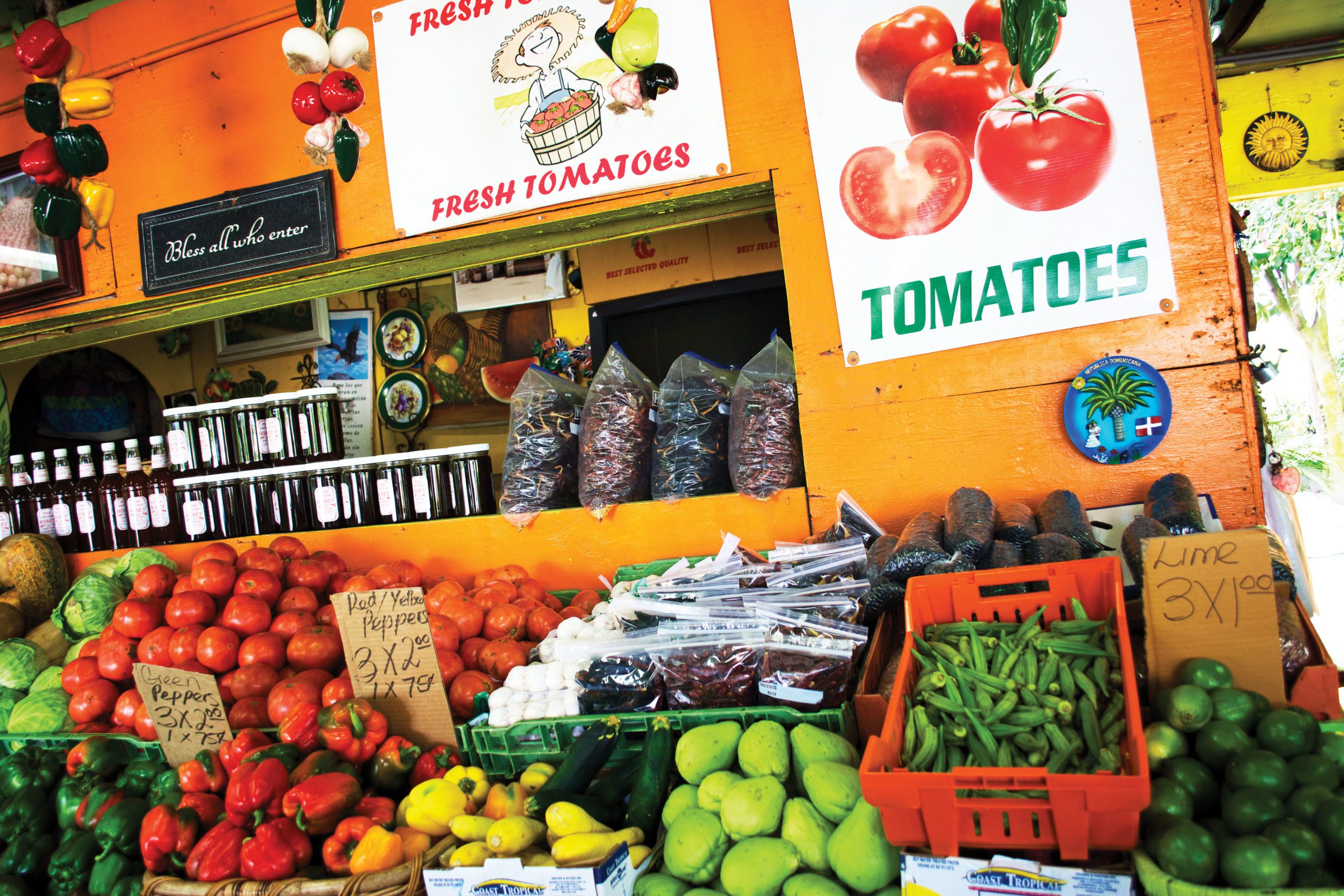Here on the paradise coast, with our miles of beaches and bright green waves, our tasteful shopping centers and elegant restaurants, our manicured lawns and restrained topiaries, it’s easy to forget that an agricultural heart beats at the center of this state. Sometimes it’s nice to be reminded—with all the delights a farming community has to offer.
That’s why I love to visit Redland, just outside Homestead, an easy two-hour drive east across the Everglades.
If you go, you’ll want to plan your trip for the winter months, during the growing season, when the agriculture industry is in full, glorious swing. To get there you might take Alligator Alley, but I would suggest going by Tamiami Trail. Start early in the day, when the sun is just coming up over the east coast, warming the cypress trees and sawgrass that stand beside the road. The light is gentler then, more golden, and by the time you reach Redland you’ll have spent the morning coasting through one of the most pristine and primal regions of Florida.
Once you hit Krome Avenue, head to the Knaus Berry Farm (15980 SW 248th St.). In the same location since 1959, the farm has u-pick strawberries and tomatoes in season, although most people come for the baked goods. With an on-site bakery, the farm offers a daily selection of cakes, pies and fresh breads—but what you really want are the cinnamon rolls. You can buy them individually (85 cents), or by the half-dozen ($4.55) or full dozen ($8.65). They arrive still warm from the oven, soft and sweet with a light dusting of cinnamon. Taste one and you’ll understand why the bakery line can stretch across the parking lot on weekend mornings. The farm stand also sells fresh produce and jams, and make sure you don’t miss the milkshakes. Nearly as famous as the cinnamon buns, the milkshakes ($3.95, small) come in a variety of flavors, including chocolate, pineapple and mango. Locals know to order the strawberry shake, made from the farm’s own berries.
Newly fueled, you’re ready to visit some of the nurseries that line Krome Avenue. Most of them do a brisk wholesale business, but many also cater to retail customers. You’ll see from the signs along the way that each nursery offers its own specialties, like orchids, bromeliads or fruit trees. I especially like Santa Barbara Nursery (20425 SW 177th Ave.) for its wide selection of ornamentals, flowering vines and palms. There are rows and rows of plants to stroll—vibrant bougainvilleas, plumerias, pentas—and the nursery has a shaded area with a waterfall and tropical birds in cages. A captivating place for anyone with horticultural tastes.
As you drive along Krome Avenue, you’ll see evidence everywhere of Homestead’s agricultural inclinations: used farm equipment for sale, an apiary shop, feed stores. Depending on the season, you can buy your vegetables from a truck on the side of the road. Many people run cottage industries, and, as you explore, you’ll see spray-painted plywood signs advertising what different homesteads have to offer—fresh eggs or honey; rabbits; goats; chickens. Avocado orchards butt against palm tree farms, which lie beside acres of papayas. Some growers have entire fields dedicated to dragon fruit. At moments, it seems as if every inch of arable land has been tilled and planted.
A visit to Redland doesn’t offer much in the way of traditional souvenirs, but if you stop at one of the fruit stands you can load up on local in-season produce. Look for bright green avocados ($2 each) that make store-bought Hass versions look puny, and mameys ($3 each), the creamy fruit with the rough brown skin and sweet potato-like interior. Krome Avenue has several fruit stands to choose from, but I’m particularly fond of Placita Los Girasoles (15970 SW 177th Ave.). In addition to the produce, much of it tropical—papayas, plantains, coconuts—Placita
Los Girasoles also offers tamales, criollos and guarapo. The tamales ($3) are served steaming hot, the thick cornmeal studded with pieces of tender pork. They come with small cups of fresh tomato sauce, and you can eat them at picnic tables beside the stand. To drink, be sure to order a batido ($4), one of the tropical juices blended with ice. Try the passion fruit or guava.
Your stomach full, the backseat of your car packed with plants, you’ll be ready to call it a day in the early afternoon. Before you head back across the state, I suggest a stop at Margarita’s (15585 SW 177th Ave.). She has a lot of what you’ll find at the other stands—fresh local produce, eggs, cheese—with a very important addition: Cuban coffee. You’ll want a cortadito (85 cents) for the drive. The caffeine will push you along, away from the red dirt of the fields planted for the growing season, past the hillocks and marshes of the Everglades, until you arrive gratefully home.





